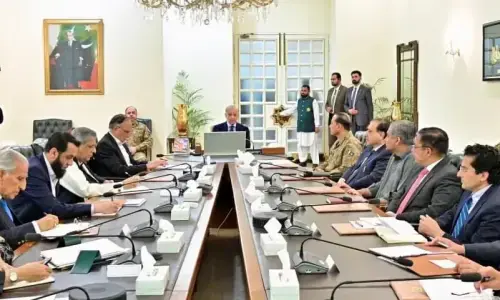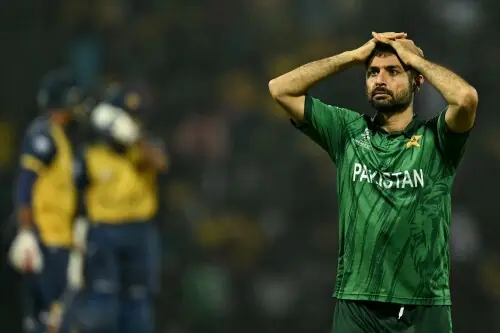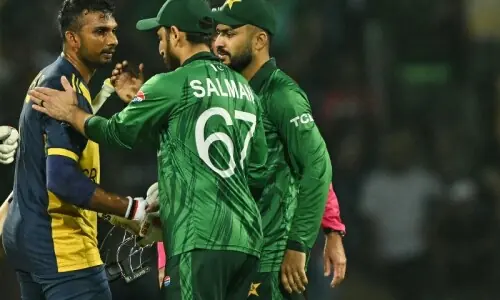Despite the deck being stacked against her government, Prime Minister Benazir Bhutto survived the November 1, 1989 vote of no-confidence moved by Nawaz Sharif and his Islami Jamhoori Ittehad (IJI). Before the vote, the presidency, army chief and intelligence agencies had forged unity and decided to act decisively, which they did. But while the establishment had held up its end, Nawaz failed to push the vote through.
An inquest was needed and Nawaz wanted answers for the debacle.
A total of 119 votes were needed to dislodge Benazir. With 92 seats in the National Assembly, the PPP needed at least another 27 votes to survive. The IJI had 54 votes but sought an extra 65 votes to oust the government. With both parties in need of additional votes, a battle to woo parliamentarians to their respective sides began in earnest.
In reinforcing party loyalties, PPP planners swung into action much before the tabling of the no-confidence resolution on October 23. During this hectic period, all efforts were geared towards reinforcing the ranks of the party, luring votes by securing the perfect deal and making up the requisite numbers.
The PPP government might have survived the 1989 vote of no confidence but who saved her?
On the other hand, the IJI focused most of their efforts on wooing the 37 independent candidates to their side. Allegedly, a lot of money was thrown around in horse-trading by both parties. The situation was such that many observers termed the politics of the time a lucrative business. In the final count, the IJI-led opposition could only bag 107 votes, falling short by 12 votes.
For the IJI, the vote result pointed to an uncomfortable reality: five of its members stayed away from what was going down. Among them was an old Nawaz loyalist, Humayun Akhtar, and his absence was noticed. As punishment, he was denied a party ticket in the October 1990 elections.
Meanwhile, the PPP wanted to know who the 37 members who had rescued their government were. One explanation was that the independent candidates whom Nawaz was banking on had broken down and voted in favour of the PPP government. This factor came as a rude shock to Nawaz given the identity of those who had joined forces to oust the Benazir government.
Before the vote of no confidence, Benazir had accused the president, the army chief and the Inter-Services Intelligence (ISI) of conspiring to bring down the government. This was termed a political statement at the time but 24 years later intelligence officials testified before higher courts that they had been involved in political manoeuvering.
In a case heard by a three-member bench of the Supreme Court in February 2013 regarding the misappropriation of Intelligence Bureau secret funds during 1989, former IB director general Masood Khan Khattak claimed that non-political forces were behind the vote. He named President Ghulam Ishaq Khan and army chief Gen Mirza Aslam Baig as the men who wanted to dislodge the Benazir government in the shortest possible span of time.
During the testimony, he also spoke about pre-poll rigging in the November 1988 elections which began with the formation of the IJI. According to him, the establishment was only forced to hand over power to Benazir on December 2, 1988 due to the weight of 92 PPP MNAs-elect at that time.
Meanwhile, independent assessments of the vote and its fallout attributed the opposition’s failure in dislodging the government to terrible political timing. It was argued that the political situation had not yet developed to such a crescendo to prompt a vote. Nor had the allegations against the PPP government built the kind of momentum that could create cracks in the ruling party. PPP loyalists too were largely satisfied with their leaders and there appeared no cause of dissention or fissures within.
Lateral entrants to the PPP had no interest in the party ideology either; their loyalty depended on personal favours that were being extended to them. In fact, there were some disgruntled elements whose loyalty to the party leadership was under question. But despite the opposition’s efforts to lure these members to their side, the members stayed put.
The independents that the IJI leadership thought would be keen on joining forces seemed inclined not to believe in mere promises. Believing that a bird in the hand is better than two in the bush, many chose to side with Benazir to gain immediate benefits.
Though the government of Benazir Bhutto was sent packing eight months later, it was not through a parliamentary vote but by presidential decree. For the time being, Article 58 2 (b) would hold greater sway than the popular mandate. It would later be removed by the one man who was adamant that it be employed in 1989: Nawaz Sharif.
Published in Dawn, Sunday Magazine, December 18th, 2016
































